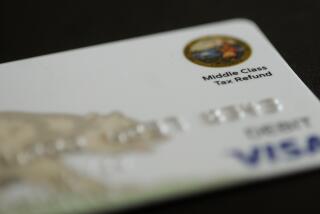The incredible shrinking present
- Share via
It’s the gift that keeps on taking.
Bank gift cards, which seem like a great idea, especially in this graduation season, have a lot of advantages over plain old retail gift cards.
The bank cards, emblazoned with the logos of card companies such as American Express, MasterCard or Visa, can be used at most places where debit cards are welcome.
And the bank cards are easy for the buyer to find. They’re available in banks, supermarkets, pharmacy chains and even neighborhood liquor stores.
But beware.
Unlike retail gift cards -- which in California and other states must not carry extra charges -- the largely unregulated bank gift cards are loaded with them, for both the gift giver and receiver.
For the buyer, there is usually a “purchase fee” that could add a 15% or larger premium to the face value.
And if the receiver doesn’t follow the card rules, often buried in small print, he or she could be assessed a variety of charges that could eat up the value of the card before it’s enjoyed.
In that case, don’t expect much of a thank-you note.
Robert Sherman, a spokesman for American Express, defended the fees.
“When you get a card for a store, it’s an advance purchase on their merchandise,” he said. “We are selling a financial service, and with that financial service comes fees.”
But the full extent of the rules, and sometimes even the fees, is not knowable when the card is purchased. It remains hidden until the package is opened and the printed insert is revealed. And those things are about as much fun to read as a prescription drug insert.
Even longtime analysts in the field can be caught off guard. Take Tower Group’s Brian Riley, who has been involved in the financial card business for nearly 30 years.
“I bought a card for my son to send to him in college and they charged me a $9.95 fee for the purchase,” Riley said. “Only when I had the card in my hands and broke the seal did I find out there was also a $4.95 monthly charge. That’s a huge maintenance fee.”
If you’re lucky, the maintenance fee will be waived for at least the first few months of use. American Express doesn’t start collecting it until a year after the card is purchased.
Sherman said the maintenance fee was to cover continuing costs, including for customer service operators. “The longer a gift card is held,” he said, “the more likely it is there will be a call in to one of our service representatives to ask the balance.”
But the maintenance fee is only one of the challenges for the receiver. A bank gift card can propel the user into a world of rules about as confusing as the one Alice faced down the rabbit hole.
The recipient might incur a hefty charge if he or she uses the card to buy an item even a penny over what is left in the account. But that balance is not easily known unless the user is meticulous in keeping track of not only what is spent but also fees. One card cited in a recent study charged a fee of 35 cents every time a purchase was made.
The cards often come with toll-free numbers for checking the balance. But some companies charge per call, on top of a maintenance fee.
If the balance is known, it can be used in a split transaction in conjunction with cash, a check or another card. But only if the rules -- which in some cases would stump an MBA holder -- are followed.
Finally, when a card expires a remaining balance usually can be issued as a check. For a fee, of course.
“In some cases there are so many fees and conditions that it’s hard to get all of that information on the cards,” said Evan Johnson, who headed up a landmark study of bank and retail gift card charges for the Office of Consumer Protection in Montgomery County in Maryland.
“There are so many details that they overflow to the insert,” Johnson said. “There is a lot to read.”
Three bank gift cards, all of which had a $25 face value, were bought in the Los Angeles area to check on fees and conditions. Each had a purchase fee of $3.95. That’s a nearly 16% premium right off the bat.
Each had a different fee structure once in use. None was as bad as some of the cards mentioned in the Maryland study that charged fees the first month, but all were depleted in value over time by fees.
An American Express Gift Card had the most lenient of charges. On the outside of the sealed package, in small print, it let the buyer know there was a $2 monthly service fee, waived for the first 12 months.
But there were plenty of conditions hidden inside. Although the package said the card was “good all over the place,” it was only after it was purchased and the seal broken that a taped-on note on the card revealed it could not be used at “airline, hotel, car rental, telecom or gasoline merchants.”
Sherman said the company recognized that the statement on the package was “confusing” and would remove it later this year.
The full cardholder agreement was on a folded, printed insert. It ran to about 5,000 words.
Among the charges listed was that the company “reserves the right to charge you a fee of $15 per transaction” if you try to use the card to make a purchase for more than is left in the account.
This, too, has been eliminated. “In the rare cases when we tried to collect that fee,” Sherman said, “there was a very negative reaction from the cardholder.”
But staying is the $5.95 fee if the card is lost or stolen.
Although the outside of the package says the funds “do not expire,” the card does. After that expiration date the company will, if requested, issue a new card for free. But if the user wants the leftover funds transferred to a check, that’s a $10 charge.
The All-Access Visa Gift Card had several fees noted on the package. They’re in small type, but they’re there. And they’re tough -- beginning with a $4.95 monthly fee after six months. And checking the balance by phone costs 50 cents a call, although it can be checked for free online.
Not mentioned on the outside of the package was a $9.95 fee to receive remaining funds by a check upon card expiration or loss.
And although the package says, “Accepted anywhere Visa debit cards are accepted,” there were qualifiers inside for restaurants and self-serve gas stations that could require the presence of excess funds in the account when the card is used.
The Vanilla Visa Gift Card had no mention of a maintenance fee on the sealed package. Inside, it said that $1.50 is assessed monthly after the first year. And although the package said, “Your balance never expires,” it costs $5.95 to get a new card when the original one reaches its expiration date, or you can get a check for the balance, but that also costs $10.
The company that issues the All-Access card said no executives were available to answer questions about it. The Vanilla card company didn’t respond to requests for an interview.
So far, the fees and rules connected with bank gift cards don’t seem to be slowing their popularity. Sales are projected by Tower Group to hit $27 billion this year, up 17% from last year.
Tim Sloane of Mercator Advisory Group said that especially egregious user charges could hurt the industry.
“If the gift has less value than the recipient thinks it has because of fees, then the feedback to the gift buyer is not going to be good,” Sloane said. “If you have that one experience and it hurts, you might associate it with the entire industry.”
Gail Hillebrand of the nonprofit Consumers Union has a simple solution: avoidance.
“When people ask me about these cards, I tell them, ‘Why not just give someone cash or a check?’ ” she said.
“They can use it anywhere, and it works.”
*
(BEGIN TEXT OF INFOBOX)
Winning at cards
If you are planning to give a bank gift card, or if you receive one, here are recommendations to help get the maximum possible value.
Buyers should check the package for low maintenance fees that don’t kick in for at least a year.
Send the receipt along with the card to make it easier for the recipient to get a replacement in case of loss.
Spend the card’s value promptly to avoid maintenance fees.
Keep a record of purchases so you know the card balance.
If you want to use the remaining value of the card in combination with a credit card or cash, notify the merchant first to make sure it can be done there.
Sources: Montgomery County Office of Consumer Protection in Maryland; Times staff
More to Read
Inside the business of entertainment
The Wide Shot brings you news, analysis and insights on everything from streaming wars to production — and what it all means for the future.
You may occasionally receive promotional content from the Los Angeles Times.











